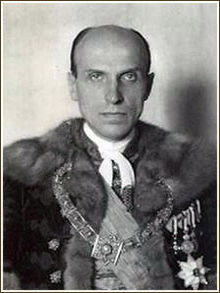Béla Imrédy

Vitéz Béla Imrédy de Ómoravicza (29th December 1891 - 28th February 1946) was the Prime Minister of Hungary from 1938 - 1939. He was also a collaborator with Nazi Germany.
Political career[edit]
As a skilled economist, Imrédy was appointed Minister of Finance in 1932, and later became head of the Hungarian National Bank in 1935. Eventually, he was appointed Prime Minister of Hungary by regent Miklós Horthy de Nagybánya in 1938. Despite initially wanting to meditate relations between Hungary and Britain, Imrédy soon changed this policy after it received criticism from his allies and fellow fascists Adolf Hitler and Benito Mussolini. Drifting further and further to the right, Imrédy eventually began enacting legislation that oppressed Jews and restricted the freedom of the press. He also attempted to restructure the government in favour of a totalitarian state.
In order to stop Imrédy' s career, his opponents went dredging through his family history and discovered his grandfather was Jewish. Due to the Anti-Semitic laws Imrédy himself had imposed at the insistence of the Nazis, he was no longer allowed to be Prime Minister and had to resign in February 1939, being replaced by Pál Teleki. After the Nazis finally occupied Hungary in 1944, Edmund Veesenmayer, German Plenipotentiary to Hungary, selected Imrédy as Prime Minister despite his Jewish heritage, but Döme Sztójay was eventually given the position instead. After the defeat of the Nazis in World War II, Imrédy was arrested and placed on trial in front of a People's Tribunal. Convicted of collaboration, War crimes and crimes against the state, Imrédy was executed by firing squad in the Marko jail in 1946.